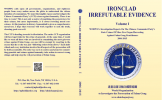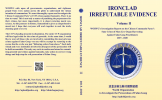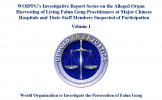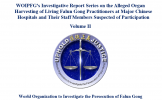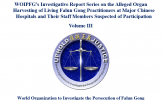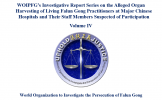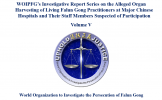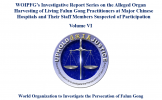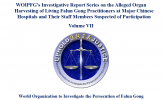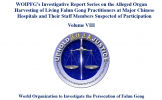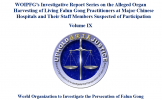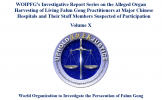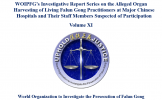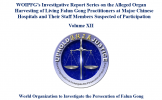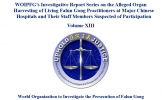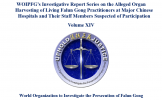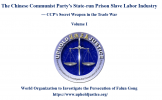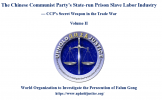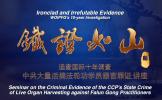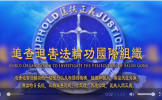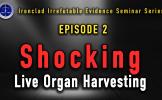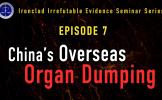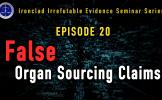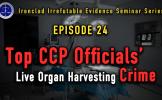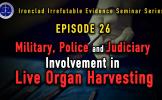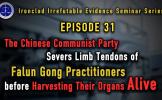The illegality of China's Falun Gong crackdown—and today's rule of law repercussions
In recent months, the world has witnessed deteriorating human rights conditions in China. From the enforced disappearance of rights activists and lawyers, to the illegal detention of artist Ai Weiwei, to a crackdown on organized crime in Chongqing that resembled a political campaign more than an effort at law enforcement. Judged by international standards, lawlessness in China appears to have become endemic. But what are the underlying causes of the current situation? In essence, it began exactly 12 years ago when the Chinese Communist Party (CCP) launched its campaign to eliminate Falun Gong, a spiritual practice with followers numbering in the tens of millions. In my remarks, I will explore how the party systematically violated Chinese laws for the purposes of implementing the persecution of Falun Gong practitioners and the impact such actions are having on today's China.
When China emerged from the Cultural Revolution, the legal system and profession had been essentially decimated. During the 1980s, some officials in the ruling Communist Party initiated efforts to establish the rule of law. A large number of laws were passed and legal education was significantly expanded. The legal profession attracted many young people. Prominent attorney Gao Zhisheng studied law and passed the bar exam during that period. Progress continued in fits and starts. Even following the 1989 Tiananmen Square massacre, when thousands of participants and supporters of the student movement were illegally persecuted and jailed, the legal system as a whole and the progress of legal reforms were not significantly affected, due to the relatively small number of people targeted.
When such reforms towards the rule of law were initiated, the regime did not realize that as an unelected ruling Party it would face certain challenges trying to institute the rule of law without relinquishing its political dominance. Firstly, the rule of law is simply incompatible with arbitrary suppression of political opponents, yet when the regime feels threatened on a large scale by some other force in Chinese society, its only response has always been to initiate a political campaign to suppress such perceived opponents. Secondly, ruling authorities' efforts to instill respect for the law can also have the more general effect of causing people to attempt to vindicate their own rights through the legal process. Both signified that the regime would face conflict with fundamental rule of law concepts, sooner or later.
In addressing them, my remarks will focus on three key points:
1) Falun Gong was never legally banned in China
2) The CCP has developed various tactics for carrying out the persecution absent a legal basis
3) These tactics are now being applied against a broader set of targets, further impacting human rights conditions in China
From the legal perspective, Falun Gong has never been banned in China
The Chinese government never legally banned Falun Gong and there is, in fact, no law on the books prohibiting this religious practice. In 2007, six prominent Chinese lawyers defended Falun Gong practitioner Wang Bo and her family. The defense statement was later posted online under the title “The Supremacy of the Constitution, and Freedom of Religion.” Some observers have called it a historic document. Following extensive analysis, the attorneys concluded: “it is clear that the punitive actions carried out at present against Falun Gong believers have no constitutional legal basis, and they should be suspended forthwith.” Since that case, a growing number of human rights lawyers have begun taking on Falun Gong cases and have discovered how the persecution is being carried out without any legal basis. Several of the following points analyzing the CCP’s claimed legal basis were also raised in their defense.
Jiang Zemin’s extralegal orders from July 19, 1999: The persecution of Falun Gong began on July 20, 1999. At the time, two documents were considered to form the basis for the persecution, but both were announced on July 22, two days after security forces engaged in mass detentions of contact persons from local exercise practice sites. The mass arrests were not carried out under an order from the government or a court order. Rather, they were implemented under directives from then-Communist Party head Jiang Zemin, directives that were reportedly issued in a secret internal meeting held on July 19, 1999 at which Jiang himself gave a speech. The title of the talk—“Speech given at the Meeting of Leaders of the CCP Committee of Provinces, Autonomous Regions and Municipalities”—itself indicates that the meeting was held under the auspices of the CCP, not the government. Diplomatic cables recently exposed via Wikileaks confirmed the occurrence of the meeting, as well as that Hu Jintao, at the time Jiang's successor and now Communist Party head, also gave a speech at the gathering.
Two ministries’ documents from July 22, 1999: The two documents subsequently issued on July 22 were titled: the “Decision to Ban the Falun Gong Research Society” issued by the Ministry of Civil Affairs, and the “Notice of Six Prohibitions from the Ministry of Public Security.” The first notice targeted the “Falun Gong Research Society” as an administrative organization, rather than Falun Gong itself as a spiritual or religious practice. In 1993, Falun Gong was a subordinate entity of the Chinese Qigong Scientific Research Society and was called the “Falun Gong Research Branch.” In March 1996, the Falun Gong Research Society formally petitioned for withdrawal from the Chinese Qigong Scientific Research Society. When the withdrawal was approved, the Falun Gong branch formally dissolved. Thus, what the Ministry of Civil Affairs banned in July of 1999 was technically an entity that had been dissolved in March of 1996.
As for Falun Gong itself as a spiritual practice, it has no formal organization, hierarchy, membership lists, or dues. The practice consists of performing five meditative exercises, studying spiritual teachings and seeking to follow the values of Truthfulness, Compassion, and Forbearance in daily life. It is a very fluid and informally structured practice. Even if the Ministry of Civil Affairs could have banned the non-existing “Falun Gong Research Society,” the ban cannot automatically be extended to cover the practice of Falun Gong itself. Therefore, legally speaking, practicing Falun Gong has never been banned.
In addition, in its “Decision to Ban the Falun Gong Research Society,” the Ministry of Civil Affairs had one cause it cited to justify the ban. It claimed that the Falun Gong Research Society had not registered in accordance with regulations. Even if this were true, according to regulations governing the registration of civic groups, not being registered does not amount to a group being illegal. The Ministry of Civil Affairs has no legal jurisdiction to ban any group.
The “Notice of Six Prohibitions from the Ministry of Public Security” then illegally extended the scope of the Ministry of Civil Affairs’ already groundless decision. Under Chinese law, these two ministries only have the authority to publish regulations within their own departments. They have no legislative or judicial power to decide what is legal or illegal. Thus, both documents well exceeded the ministries’ jurisdiction. In addition, both documents were in direct violation of Article 36 and Article 5 of the Chinese Constitution. Article 36 grants Chinese citizens the freedom of religious belief and Article 5 holds that all state organs must abide by the Constitution and the law.
A third document, often viewed as forming part of the core basis for the persecution, was titled “Notice from the Central Committee of the Chinese Communist Party Forbidding Communist Party Members from Practicing Falun Gong.” As a Party document, it is applicable only to Party members and therefore cannot be considered to hold any legal standing for society at large.
National People’s Congress Decision from October 30, 1999: In addition to the above documents issued in the early days of the persecution, several months later, another set of decisions was published, which have often been seen to form a legal foundation for persecuting Falun Gong. However, when examined closely, it becomes evident that, they too, do not legally ban Falun Gong. On October 30, 1999, China’s National People's Congress Standing Committee ratified a “Decision to Ban, Safeguard Against, and Punish Cult Activities.” In analysis by human rights groups and legal scholars, this is often cited as the basis for the campaign. However, it contradicted Article 36 of the Constitution, rendering it invalid. In addition, the document did not specifically mention Falun Gong. Perhaps the drafters of the document still had the basic concept that legislation could not be passed outlawing a specific group. Although the Chinese authorities typically use this and other anti-cult regulations to justify targeting Falun Gong practitioners, from a legal standpoint, the regulations themselves do not mention Falun Gong.
How the persecution operates without a legal basis
Given that the persecution of Falun Gong has no legal basis, how has the regime managed to implement it? In 1999, when the campaign was first launched, China was quite different from it was in Mao’s era. On the surface, at least, China had established a functioning legal system and many laws had been passed. The regime therefore used several tactics to bypass the law and carry out a large-scale and violent political campaign.
1) Creating a new chain of command outside the realm of the legal system. On June 7, 1999, 43 days before the persecution was launched, Jiang Zemin announced in a meeting of Politburo members that a new leadership team would be established under the CCP’s Central Committee to deal with the Falun Gong issue. Under this leadership team, an office was established to handle day-to-day duties and called, “the Office of the Leadership Team of the CCP Central Committee for Handling the Falun Gong Issue.” That office is more commonly known as “the 6-10 Office,” named for the date it was established: June 10, 1999. After that date, almost every Party branch, from the province to the county to the district level, established its own 6-10 Office. The source of the 6-10 Office’s ability to operate extralegally and with impunity is not drawn from the State. Neither the People's Congress nor the State Council has authorized its actions. Rather, approval and support for its deeds comes from the Communist Party. Each 6-10 Office takes orders from the 6-10 Office one level above it, going up to the Central 6-10 Office. The local 6-10 Offices also take orders from the leadership team of the CCP Committee at its same organizational level. Today, thousands of 6-10 Office branches remain active throughout China.
2) Using the existing Party system to interfere with the implementation of the law. In China, the judiciary is not independent but rather, faces significant interference from the Communist Party. The Political and Judiciary Committee is the CCP body most often used to influence law-related organs from behind the scenes. As stated by the Central Political and Judiciary Committee: “The Central Political and Judiciary Committee is a functional department for the CCP Central Committee to lead and administer political and law related work.” At the central level, the government organs under the committee’s influence include the Supreme Court, the Supreme Procuratorate, the Ministry of Public Security, the Ministry of State Security, and the Ministry of Justice. The same set-up applies to all levels of governance in China, with the Political and Judiciary Committee influencing the corresponding organs at each level. Most 610 Offices are set up within the Political and Judiciary Committees. This has made aspects of the 610 Office’s work related to detentions and imprisonment more convenient and easy to implement.
3) Twisting the laws, causing them to be used on Falun Gong by illegally interpreting the laws. Since a law could not be passed targeting one specific group, the Supreme Court and the Supreme Procuratorate have issued “Interpretations” to close this gap. The “Interpretations from the Supreme Court and the Supreme People's Procuratorate Regarding the Application of the Law in Handling Cases Involving Heretic Organizations” Part 1 (dated October 8 and 9, 1999) and Part 2 (dated June 4, 2001) are examples of this phenomenon. However, these “Interpretations” are invalid from a legal standpoint, contradict article 36 of the Constitution, and overstep the jurisdiction of the bodies that issued them. Article 42 of the Legislative Law of the PRC states that clarifications regarding the appropriate execution of a given law can only be made by the Standing Committee of the National People's Congress (NPC). The Supreme Court and the Supreme People's Procuratorate thus had no jurisdiction to interpret the law as they did. In addition, neither of these Interpretations mentioned Falun Gong by name. Instead, both the Supreme Court and the Supreme Procuratorate issued separate administrative and extralegal notices to detail how to apply the NPC “Decision” and the two above-mentioned “Interpretations” to Falun Gong.
4) Issue internal memos, documents, and circulars to direct the persecution. The persecution is mostly carried out by internal documents marked as “classified” or even “top secret.” Such documents can be issued at any level, but from the various ones leaked online or via informants in the government it appears that almost all are modified copies of orders that originated from the CCP’s Central Committee or its 610 Office. For example, a letter by Jiang Zemin from April 25th and a June 7th speech in 1999 were distributed by the Office of CCP Central Committee as formal CCP internal documents to direct the persecution even before the it had formally started. Relevant CCP members and bodies are typically instructed to study such speeches and carry out their aims. More recently, an internal document issued by the 610 Office of the CCP Central Committee in 2010 initiated a three-year campaign to reinvigorate the brainwashing and “transformation” of Falun Gong practitioners. Analysis by the Congressional-Executive Commission on China found that versions of the orders and plans for their implementation appeared on websites across China at various levels of the party apparatus. According to the Legislation Law of the PRC, higher-level laws carry more authority than lower-level laws. But, in order to persecute Falun Gong, the CCP has reversed this rule in practice. The internal CCP documents override laws and regulations, the “Notices” override the “Interpretations” of the Supreme Court and Procuratorate, the “Interpretations” override the “Decision” of the Standing Committee of the National People's Congress, and the “Decision” overrides the Constitution.
5) Article 300 of the Chinese Criminal Code is the most commonly used way to charge Falun Gong practitioners with a crime and sending them to prison for up to 18 years. Over the past 12 years, thousands of innocent practitioners have been subjected to such punishments. Article 300 establishes “using heretical religious organizations to disrupt the implementation of law” as a crime, which, besides once again contradicts Article 36 of the Constitution, cannot be legitimately applied to Falun Gong for various reasons. As raised by Chinese lawyer Wang Yonghang in a 2008 open letter to the Supreme Procuratorate, it does not meet minimal international legal standards of clarity and specificity. In practice, the government organs that have tried to charge Falun Gong practitioners at the behest of the 610 Office have never been able to legitimately demonstrate that the practitioners had committed an actual crime. It has never been established in court which law's implementation is disrupted by Falun Gong adherents peacefully practicing their faith, doing their exercises, or disseminating information on human rights abuses.
6) Using the existing extrajudicial system of Reeducation-through-Labor, as well as mental hospitals and newly established brainwashing centers to jail and torture Falun Gong practitioners. Reeducation-through-Labor (RTL) is an administrative punishment that was first introduced by the Ministry of Public Security in 1957 to persecute “counter-revolutionaries” and “Rightists”. The most recent update is that the State Council approved the Ministry of Public Security report on their status in 1982. Since both MPS and the State Council have no legislative power, this is not a legally sanctioned system. Any Chinese citizen can be sent to a labor camp for as long as three years without any legal process and can have this extended by an additional year for “bad behavior.” The RTL system quickly became the CCP’s most convenient tool for persecuting Falun Gong. The CCP found it to be a quick, efficient way for punishing adherents, torturing them, and locking them away until they renounced their faith. Although there had previously been scattered reports of mental hospitals being used to jail dissenters, this was not a common phenomenon until the campaign against Falun Gong began. But since 1999, mental hospitals have been widely used to detain practitioners not only because no legal process is needed but also because this tactic can further isolate and demonize Falun Gong practitioners in the eyes of the Chinese public. Brainwashing centers is another system established for persecuting Falun Gong. This network involves makeshift detention centers in schools, hotels, senior citizens homes, and so-called “legal education centers,” where adherents are taken and subjected to severe psychological pressure and physical abuse aimed at forcing them to renounce their faith and pledge allegiance to the CCP. People are typically held for several weeks, but can be detained for months or even years. Over the past twelve years, such centers have been established at different administrative levels, from the provincial to the neighborhood level, from local 610 Offices to state-run enterprises.
7) The systematic, illegal use of torture. In their public statements, Chinese officials often state that torture is prohibited. China has also signed international treaties prohibiting torture and Chinese criminal law includes provisions for perpetrators to be punished. In practice, though, when the regime was faced with a group the size of Falun Gong and was trying to accomplish an impossible task—to force tens of millions of people to give up their beliefs—CCP leaders decided to resort to systematic torture. It is difficult to find the direct orders, especially written documents, of specific instructions to use torture on Falun Gong. However, there is widespread evidence that physical violence is used deliberately and systematically. In August 2001, Washington Post reporters John Pomfret and Philip Pan authored an article titled: “Torture Is Breaking Falun Gong; China Systematically Eradicating Group.” This was the first time that a Western media outlet obtained a quote directly from a high ranking official acknowledging that violence used against Falun Gong practitioners is part of a well-designed strategy. Numerous testimonies and eyewitness accounts by Falun Gong practitioners, human rights lawyers, and former detainees imprisoned with practitioners confirm the widespread and routine use of brutal torture tactics on Falun Gong adherents. These include shocks with electric batons, torture devices like the Tiger Bench, severe beatings, injections with drugs, and long-term deprivation of food and sleep. The United Nations Special Rapporteur on Torture, Amnesty International, and other human rights bodies have also reported on the prevalent use of such torture methods against Falun Gong. Moreover, instances of perpetrators being punished for such acts as required by Chinese law are few and far between. More common is for individual officials and detention facilities known for obtaining high transformation rates through torture to be rewarded in various ways, including through promotions and monetary bonuses.
The whole set-up allows assurance that no law need be used on Falun Gong practitioners. The result was that judges would only take internal documents, secret memos or even phone calls from CCP officials as guidance for sentencing Falun Gong practitioners to prison. Even worse, many cases have been decided in internal meetings with CCP officials before a trial has even taken place and the judge had yet to see the defendant. In other cases, no legal proceedings are held at all for those sent to labor camps.
How anti-Falun Gong tactics have formed the foundation for other human rights abuses
Given the large size of the victimized Falun Gong population, and the lengthy twelve-year (continuing) campaign to suppress this religion, the impact of the above-mentioned dynamics on the prospects for rule of law in China has been significant. Moreover, those at the inner circle of political power are unlikely to stop their repression at Falun Gong. Rather, they have found it easy to extend their illegal practices beyond that one target. With the anti-Falun Gong campaign already establishing a sophisticated way of breaking the law to reach its goals, it has become easier for the Chinese authorities to apply the same tactics to others. In their analysis of the recent crackdown on lawyers, both Chinese law expert Jerome Cohen and Freedom House researcher Sarah Cook have pointed out that extralegal tactics used against Falun Gong practitioners and petitioners are now being expanded. Actually, there are many facets to how the CCP has used anti-Falun Gong measures against other targets, including:
1) Expanding the use extralegal detention facilities and abductions. For years, Falun Gong practitioners have been subjected to illegal abductions from their homes and workplaces, detention without warrants, confiscation of property and computer equipment, and confinement without family members being notified. All of these measures have become a feature of the crackdowns in recent months on human rights lawyers and activists like Ai Weiwei. In addition, mental hospitals are now being used more and more frequently on non-Falun Gong petitioners, demolition victims, and grassroots activists. The Ministry of Public Security apparently finds this system so effective that in May 2010, it demanded that every provincial bureau must have at least one mental hospital of its own. It even issued an order that “without the approval of the public security (police), no normal person should be admitted to the mental hospital.” In addition, the notorious network of makeshift detention centers known as “black jails” used to hold tens of thousands of petitioners is similar and very likely originated from brainwashing centers created for Falun Gong practitioners, a system that became prevalent before the widespread use of “black jails.” The retrieval system created to stop adherents from appealing in Beijing and peacefully protesting on Tiananmen Square, a popular Falun Gong tactic between 1999 and 2001, also formed the basis for what is used today against a range of petitioners.
2) The expansion of police brutality and impunity. This has been evident in two ways. First, human rights lawyers have reported being told that torture methods that were being used or could be used against them were devised for use against their Falun Gong clients. In a 2009 letter documenting his torture in custody, Gao Zhisheng reported his torturers saying: “You are correct, we torture Falun Gong…. The 12 courses [of torture] we’re going to give to you were practiced on the Falun Gong, to tell you the truth.” More recently and prior to his latest abduction, attorney and law professor Teng Biao reported in December 2010 that Beijing police hinted that they would use the same torture methods from Falun Gong on him, sending a chill down his spine. Second, officials who were promoted for their so-called “effective” dealing with Falun Gong, have subsequently used torture on other detainees, to fatal effect. Perhaps the most well-known such incident was the beating to death of Sun Zhigang in 2003. After Sun’s death was exposed and a public outcry ensued, twenty-three local officials were disciplined. One of them was the vice director of the Tianhe district Public Security Bureau in Guangzhou. Records from Falun Gong sources show that this person has already been listed as one of the people responsible for the death of Falun Gong practitioner Li Xiaojin in June 2002. This was a typical case where not only did the torture to death of a Falun Gong practitioner go unpunished, but the person responsible was even promoted. If the policemen who were responsible for Li Xiaojin's death had been punished at the time for killing her, Sun Zhigang might be still alive today.
3) Falsely labeling other petitioners and activists as Falun Gong to facilitate lawless behavior. Hebei Daily’s online version published an article titled “the Last Petition.” It recounted how a petitioner had gone to Beijing for the fourth time to complain about the corruption of the local county CCP secretary. In response, the secretary instructed the local CCP office to call Beijing’s 610 Office, falsely claiming that the petitioner was a Falun Gong practitioner armed with explosives. The Beijing 610 Office received the fake information, mobilized the police to search for this person, and finally caught him. It turned out later that he was not a Falun Gong practitioner, but the local CCP secretary was able to use this label to spark a manhunt against him by the 610 Office. This phenomenon has also appeared in better known cases of local protests against official injustice. In June 2009, demonstrations broke out in Shishou, Hubei province in response to the suspicious death of a young male chef at a hotel known for its close connection with local officials. Thousands of paramilitary riot police were sent to quell the demonstrations. The state-run media tried to falsely portray the protests as Falun Gong-incited unrest. One local resident told Reuters that the authorities informed residents that “the police had been called in to suppress gangsters and members of the banned Falun Gong spiritual group.” Also in Hubei, during the 2009 case of Deng Yujiao, a hotel worker who killed a local official as he tried to rape her, volunteers who went to Badong to support her were framed as Falun Gong practitioners. In December 2010, government officials from Jinan in Shangdong threatened victims of forced demolition that if they didn’t agree to the compensation deal offered by the authorities, they would be treated as Falun Gong practitioners or counter-revolutionaries. There are many other similar cases. Local authorities have learned that once a case is linked to Falun Gong, they can ignore the law, use brutality, and other “special treatment” towards people to get their way.
To conclude, in examining human rights abuses in China, it is important to keep in mind that we are not dealing with a state where the legal system is established and now needs to be perfected. We are rather dealing with a regime that does not respect its own laws. Instead, the ruling Party systematically and intentionally breaks the laws of the State and designs measures to circumvent the legal rights guaranteed to citizens.
Thank you.
References:
1. Teng Biao, Li Heping, et al., “The Supremacy of the Constitution, and Freedom of Religion,” A Sword and a Shield: China’s Human Rights Lawyers, ed. Stacy Mosher and Patrick Poon, Chinese Human Rights Lawyers Concern Group, 2009; pg 84.
2. Shandong Youth University of Political Science. <zai sheng shi zhi zhi qu zhi xia shi dang wei fu ze tong zhi hui yi shang de jiang hua> Speech given at the Meeting of Leaders of the CCP Committee of Provinces, Autonomous Regions and Municipalities. Jiang Zemin, July 19, 1999. http://www.sdyc.cn/qgy/xuexiyuandi/qita/shenru.html
3. Wikileaks, “22.07.1999: Falun Gong Crackdown, Day Three,” Aftenposten, March 28, 2011, http://www.aftenposten.no/spesial/wikileaksdokumenter/article4075684.ece
4. The Ministry of Civil Affairs of the PRC, “Decision to Ban the Research Society of Falun Dafa by the Ministry of Civil Affairs of the People's Republic of China,” July 22, 1999. http://www.people.com.cn/GB/channel1/10/20000706/132286.html
5. The Ministry of Public Security of the PRC. “Notice of Six Prohibitions from the Ministry of Public Security.” July 22, 1999. http://www.people.com.cn/GB/channel1/10/20000706/132280.html
6. Constitution of the People’s Republic of China, Articles 36 and 5, http://www.usconstitution.net/china.html
7. “Legislative Resolution on Banning Heretic Cults,” China Daily, October 30, 1999. http://www.purdue.edu/crcs/itemResources/PRCDoc/pdf/Legislative_Resolution_on_Banning_Heretic_Cults.pdf
8. World Organization to Investigate the Persecution of Falun Gong (WOIPFG), “Investigative Report on the 610 Office,” Created on September 8, 2003, Updated on February 1, 2011. http://www.upholdjustice.org/node/197
9. “Introduction of the Political and Judiciary Committee of CPC Central Committee,” People’s Daily, July 17, 2007. http://cpc.people.com.cn/GB/64114/64135/5994757.html
10. people.com.cn “Interpretations from the Supreme Court and the Supreme People's Procuratorate Regarding the Application of the Law in Handling Cases Involving Heretic Organizations” October 8 and 9, 1999. http://www.people.com.cn/GB/shehui/46/20010321/421657.html;
people.com.cn “Interpretations from the Supreme Court and the Supreme People's Procuratorate Regarding the Application of the Law in Handling Cases Involving Heretic Organizations (2)” June 4, 2001. http://air.people.com.cn/GB/shizheng/16/20010611/486116.html
11. pkulaw.cn (Peking University Law Net) “Notice of the Supreme People's Court on Implementation of the 'Decision to Ban, Safeguard Against, and Punish Cult Activities' of the Standing Committee of the National People's Congress and the 'Interpretations' of Supreme Court and Supreme Procuratorate” (Supreme Court Issue #29, 1999) November 5, 1999.
http://www.pkulaw.cn/fulltext_form.aspx?Gid=26459&Db=chl;
pkulaw.cn (Peking University Law Net) “Notice of the Supreme People's Procuratorate on Implementation of the 'Decision to Ban, Safeguard Against, and Punish Cult Activities' and the relevant 'Interpretations' ” (Supreme Procuratorate Issue #22, 1999) October 31, 1999. http://www.pkulaw.cn/fulltext_form.aspx?db=chl&gid=23700
12. “The documents of the CCP Central Committee on Falun Gong,” Beijing Spring, Volume 97, June, 2001. http://beijingspring.com/bj2/2001/60/2003727210907.html
13. Congressional-Executive Commission on China (CECC), “Communist Party Calls for Increased Efforts To ‘Transform’ Falun Gong Practitioners as Part of Three-Year Campaign,” March 22, 2011. http://www.cecc.gov/pages/virtualAcad/index.phpd?showsingle=154369
14. “The Legislation Law of the People's Republic of China,” Chapter V, Articles 78 to 80, http://www.gov.cn/english/laws/2005-08/20/content_29724.html
15. epochtimes.com “Wang Yonghang: Big mistakes have been made, which should be corrected as soon as possible” July 17, 2008. http://www.epochtimes.com/gb/8/7/20/n2198340.html
16. WOIPFG, “The Destruction of Mind and Body Through Brainwashing,” April 28, 2004. http://www.upholdjustice.org/node/60
17. Jerome A. Cohen, “Happy Returns?” South China Morning Post, June 22, 2011. http://www.cfr.org/china/happy-returns/p25332;
Sarah Cook, “Prepared Statement of Sarah Cook, Asia Research Analyst and Assistant Editor, Freedom on the Net, Freedom House,” Congressional-Executive Commission on China Roundtable on “Current Conditions for Human Rights Defenders and Lawyers in China, and Implications for U.S. Policy,” June 23, 2011. http://www.cecc.gov/pages/roundtables/2011/20110623/statement1.php
18. Wuhan Evening News (from China Police Net), May 26, 2010. “Ministry of Public Security: “without the approval of the public security (police), no normal person should be admitted to the mental hospital.” http://www.lwgcw.com/NewsShow.aspx?newsId=6876
19. Gao Zhisheng, “Dark Night, Dark Hood and Kidnapping by Dark Mafia,” translated and published by Human Rights in China, February 8, 2009. http://hrichina.org/public/PDFs/PressReleases/2009.02.08_Gao_Zhisheng_account_ENG.pdf
20. Teng Biao, “A Hole to Bury You,” Wall Street Journal, December 28, 2010. http://online.wsj.com/article/SB10001424052970203731004576045152244293970.html
21. Xinhua News Agency, June 5, 2003. Sun Zhigang's Death from Intentionally Injury on Trial, 20+ responsible individuals are disciplined. http://news.xinhuanet.com/newscenter/2003-06/05/content_905017.html
22. The original webpage with the article has since been deleted. The author has a screenshot on file which is available upon request.
23. Huaiyin District, Jinan, the violent demolition: Whoever refuses to sign the agreement will be punished as Falun Gong. January 6, 2011. http://groups.google.com/group/weiquanwang_CHRD/browse_thread/thread/296cc65a0f5e31b0
(CHRD is under attack. This link is google group.)


